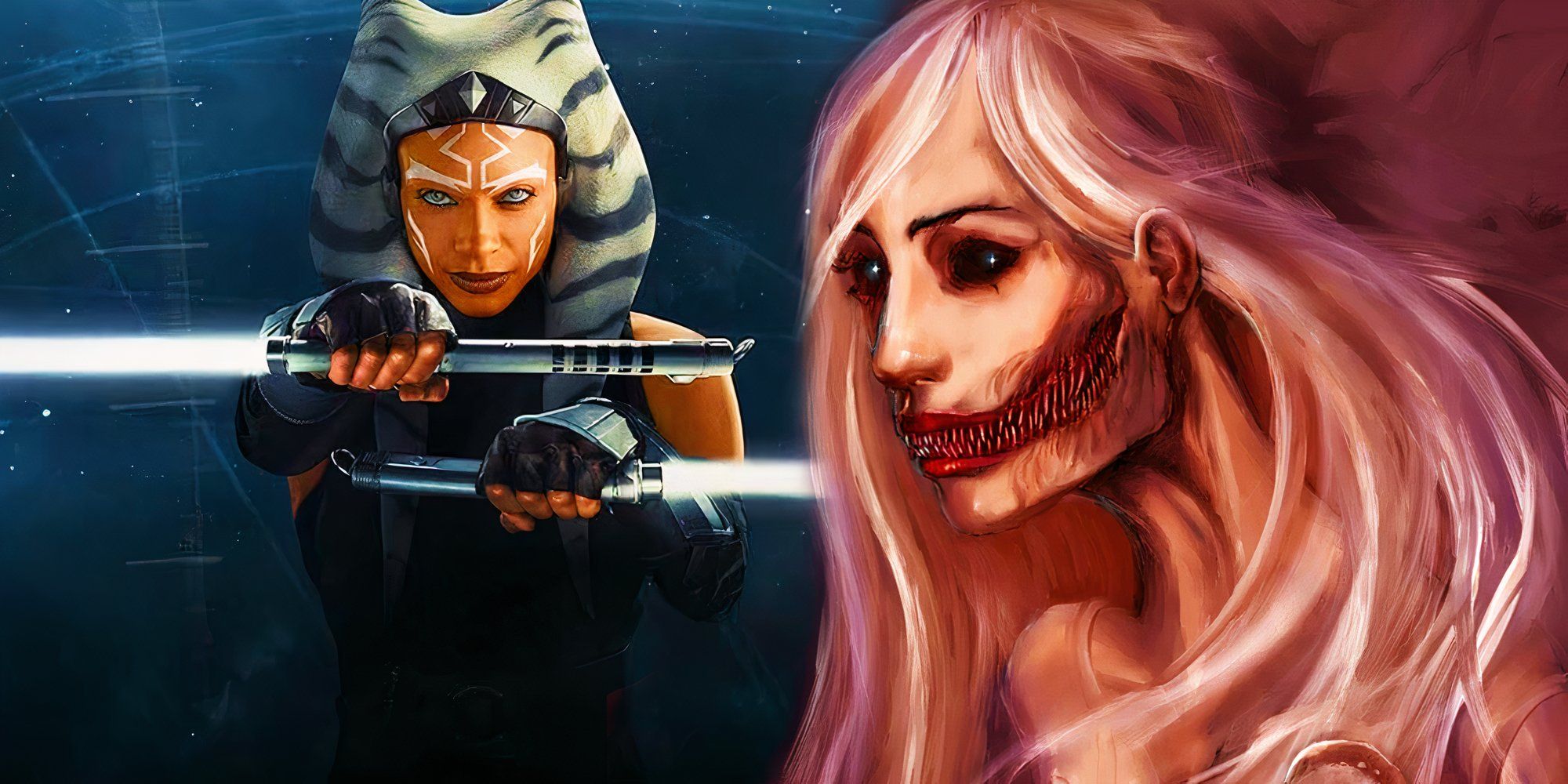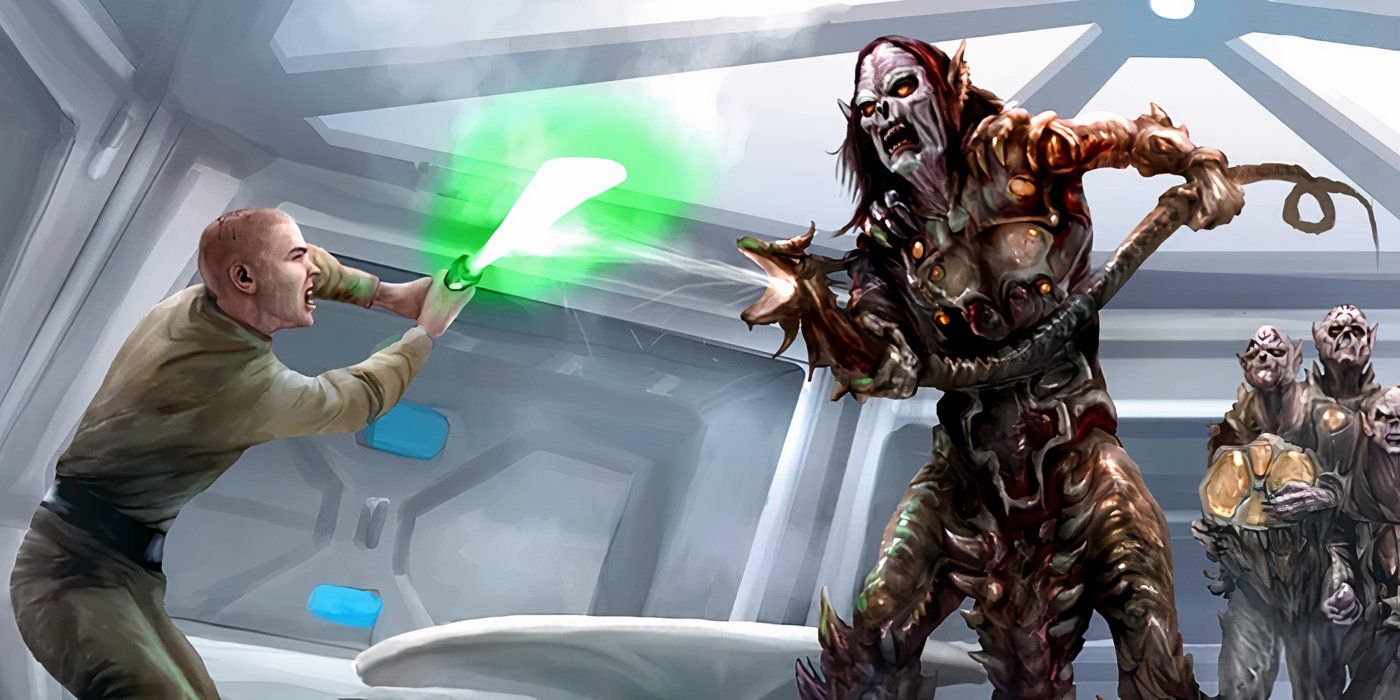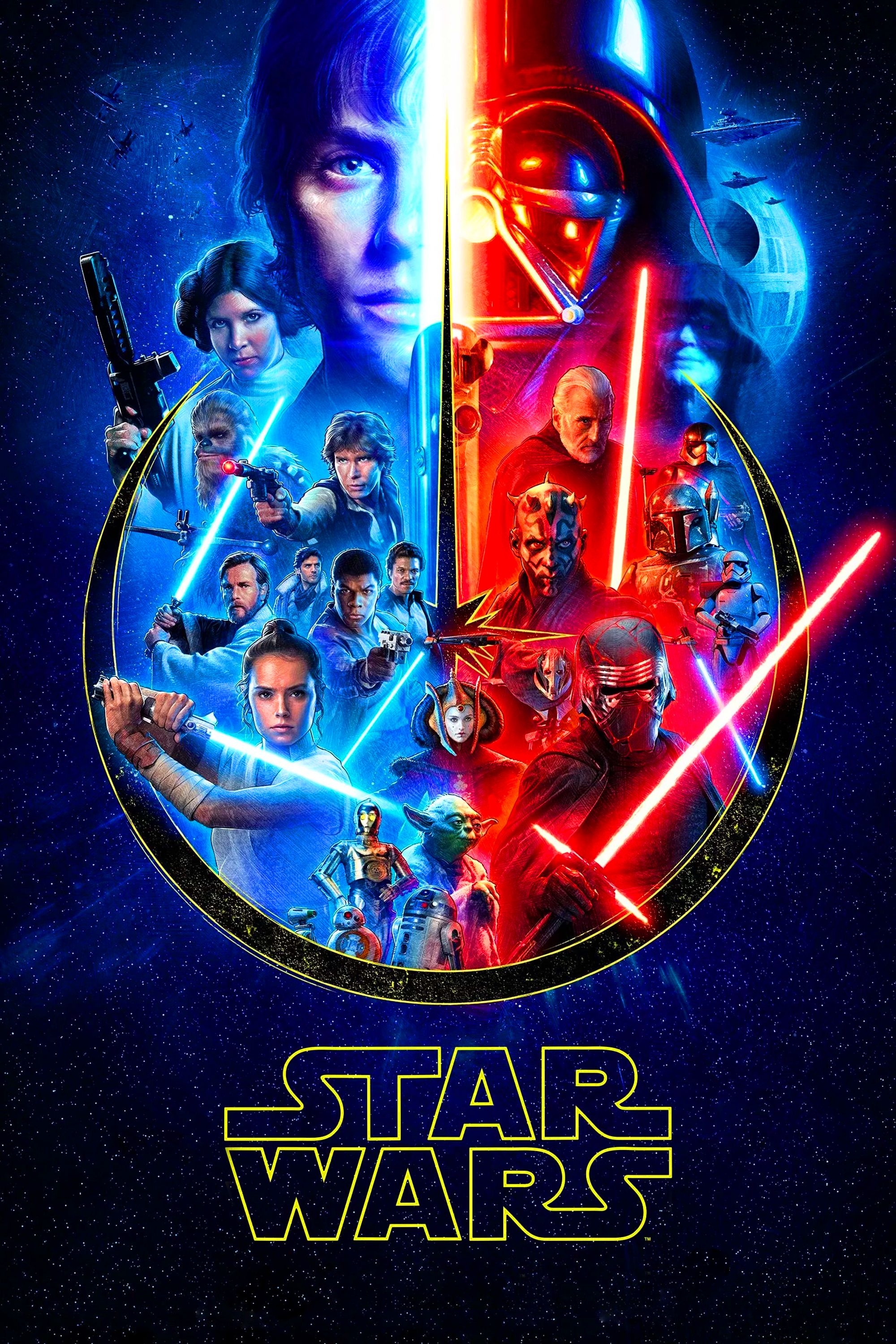The Star Wars sequel trilogy resurrected Emperor Palpatine as a last-minute villain, but many other characters from across the saga could have served as a better antagonist. When Supreme Leader Snoke was shockingly killed off in Star Wars: The Last Jedi, the next film was put in a difficult position when selecting its villain. The filmmakers could have stuck with Kylo Ren, who assumed full command of the First Order, but the lack of another suitable replacement would have discounted the possibility of Ben Solo’s redemption.
Star Wars: The Rise of Skywalker director and co-writer J.J. Abrams’ solution was to reveal that Palpatine has survived his apparent death in Return of the Jedi. By making him the true mastermind of the First Order, the Star Wars sequel trilogy had a villain who could pose a serious threat and tie into the previous Star Wars movies. Unfortunately, Palatine somehow returning created more problems than it solved, and 11 characters from Star Wars canon and Legends demonstrate how the sequel trilogy’s final big bad could have been so much better.
11 Another Snoke Clone
Keep the main villain consistent
Although Snoke’s death was a surprising twist on first viewing, it was also disappointing for the sequels’ biggest villain to be killed off so soon without being fully fleshed out. The closest viewers got to an explanation was the reveal that Palpatine created Snoke on Exegol, but this raised even more questions that were never answered. It wasn’t clear if Snoke was a failed experiment who struck out on his own, or if he was Palpatine’s puppet the whole time.
This could even explain why Snoke looked and acted somewhat differently in
The Last Jedi
compared to
The Force Awakens
, with two or more Snokes working together the whole time.
However, the other Snoke clones seen in the tanks on Exegol also present an interesting alternative for The Rise of Skywalker. Instead of having Palpatine return, the movie could reveal that there was another Snoke clone, preserving his shocking death while maintaining some consistency across the films. This could even explain why Snoke looked and acted somewhat differently in The Last Jedi compared to The Force Awakens, with two or more Snokes working together the whole time.
10 Tsavong Lah
Warmaster of the Yuuzhan Vong
If the sequel trilogy wanted to bring back a character from the Star Wars Legends timeline, one of the most intriguing choices would be Warmaster Tsavong Lah. The Yuuzhan Vong were the villains of the Star Wars: The New Jedi Order book series, a warrior race from beyond the galaxy who attempted to conquer everything in their path. While there were several great Yuuzhan Vong characters, Tsavong Lah would be an especially good villain, as he was essentially The New Jedi Order equivalent to Darth Vader.
Many viewers felt that the First Order-Resistance War was too similar to the original trilogy, so having the Yuuzhan Vong invade the galaxy would shake things up. It could even be revealed that the Yuuzhan Vong were one of the reasons Palpatine was obsessed with building superweapons, calling back to how he used them as an excuse when recruiting agents in Legends. Tsavong Lah would also be a good rival to Ben Solo, just as he was to Jacen Solo in The New Jedi Order, and the sequels could adapt the moment when Jacen defended his mother from Tsavong Lah.
9 Exar Kun
The spirit of an ancient Sith Lord
Another Legends character who would be a good sequel trilogy villain, and one who still exists in canon, is the Sith Lord Exar Kun. A Jedi who lived 4,000 years before the Star Wars movies, Exar Kun fell to the dark side and discovered the knowledge of the ancient Sith Lords. He waged war against the Jedi and the Republic but was inevitably defeated, and his spirit became trapped in the Massassi Temples on Yavin 4. Thousands of years later, Exar Kun attempted to convert Luke Skywalker’s Jedi students to the dark side, but they succeeded in banishing him for good.
Some canon Star Wars reference books have mentioned Exar Kun, so it wouldn’t be too hard to adapt a version of his story. Rather than finding Palpatine, Kylo Ren could find Exar Kun’s trapped spirit on Exegol, who promises to help him crush the Resistance once and for all. However, Exar Kun would gain control over Kylo Ren’s mind, as he did with Luke’s students in Legends, until Rey and Leia manage to break his grip. Ben and Rey would end the movie by teaming up, with the spirits of past Jedi helping to banish Exar Kun.
8 Lumiya
The Dark Lady of the Sith
When discussing Star Wars Legends villains with a connection to Luke Skywalker and a knack for manipulating Solo children, few characters were as skillful as Lumiya. Originally Imperial Agent Shira Brie, Lumiya was sent by Darth Vader to infiltrate the Rebel Alliance and find a way to hurt or kill Luke Skywalker. She did so by proclaiming romantic feelings for him and then faking her death by flying her fighter in front of Luke’s laser blasts. Luke was devastated, believing he had killed the woman he loved, and he was temporarily disgraced until Shira’s true nature was later revealed.
After a series of encounters left her scarred and damaged, Shira swore vengeance on Luke. She received dark side training and cybernetic enhancements from Vader, and after he and Palpatine were killed, she declared herself the Dark Lady of the Sith. Decades later, Lumiya successfully converted Jacen Solo to the dark side as Darth Caedus before she was killed by Luke. Having a personal history with Vader and the Skywalker family would make Lumiya the perfect villain to manipulate Ben Solo in canon, just as she did to Jacen in Legends.
7 Kylo Ren
Commit to Ben Solo’s dark side path
Of course, while the sequel trilogy did have many great Legends villains to choose from, the final Star Wars episode could have committed to Kylo Ren as the main antagonist. This was the original plan in the first draft of Star Wars: Duel of the Fates, Colin Trevorrow’s version of Episode IX before he left the project in 2017. Kylo Ren and General Hux, now Chancellor Hux of Coruscant, would have split leadership responsibilities of the First Order, with Kylo Ren seeking dark-side knowledge and Hux leading the military forces against the Resistance.
While having Kylo Ren as the main villain would have made his redemption much more difficult, Trevorrow’s script showed that committing to his villainy was a viable option. Kylo Ren would have died fighting Rey on Mortis, making his fate even more tragic and distinguishing his story from Darth Vader. Alternatively, Ben Solo could be redeemed at the very end, defeated but still alive to possibly make amends for his crimes in the future.
6 The Knights Of Ren
Ben Solo’s redemption would cause his order to intervene
If the filmmakers wanted Kylo Ren as the initial main villain but also wanted a Ben Solo redemption, then the reigns could have been handed over to the Knights of Ren. After years of being hyped up and hinted at, the Knights of Ren were criminally underutilized in The Rise of Skywalker, barely doing anything until the end when they were easily defeated by Ben Solo. Colin Trevorrow’s Duel of the Fates script handled them a little better, but having them as the main villains could have fleshed them out and provided the ultimate challenge for a redeemed Ben Solo.
While fleshing out all six characters in the last movie would have been a challenge, Star Wars comics have presented a solution. Star Wars: The Rise of Kylo Ren by Charles Soule and Will Sliney showed what the Knights of Ren were like before Ben Solo took over, led by a man named Ren. Focusing on just one new character, while still having good chemistry with the other Knights of Ren, would have allowed the final threat to be a group of villains instead of just one.
5 Darth Krayt
A perfect villain to tie the saga together
Regarding a group of villains, another powerful leader and Sith Lord was Darth Kryat, who served as the perfect final villain to the Legends timeline. Once a Jedi called A’Sharad Hett, Krayt was the main villain of Star Wars: Legacy by John Ostrander and Jan Duursema, set over 130 years after Return of the Jedi. What made Krayt such a perfect villain for this era was how his backstory connected to the Skywalkers and was shaped by almost every era of the Expanded Universe up to that point:
- He was raised as a Tusken Raider on Tatooine and later as a Jedi Knight during the prequel era.
- He learned about Anakin Skywalker’s dark side but chose not to report him to the Jedi Council.
- After surviving Order 66, he was trained by the holocron of a Sith Lord from the Old Republic era.
- He devoted himself to killing Darth Vader and the Emperor, but Luke Skywalker intervened before he could.
- He was captured by the Yuuzhan Vong, who implanted organisms that threatened to take over his body.
- He used Darth Caedus’ actions during the Legacy era as a distraction while he created his own Sith Order.
Krayt being a byproduct of the entire Star Wars timeline would make him the perfect final villain of the sequels, with a few changes to his backstory. His strategy of using other Sith as a distraction while he gathered his forces is similar to Palpatine’s strategy in The Rise of Skywalker, making it easy for him to fill the same role. Most significantly, Krayt’s One Sith abandoned the Rule of Two, which would allow for an army of Sith and maintain the Chosen One prophecy by having the old Sith Order end with Return of the Jedi.
4 Grand Admiral Thrawn
The villain many EU fans hoped to see
Not all Star Wars villains have to be Force users or masters of hand-to-hand combat, as proven by characters like Grand Admiral Thrawn. Introduced in Timothy Zahn’s Star Wars: Heir to the Empire, which relaunched the Expanded Universe in 1991, Thrawn was a tactical genius, which made him a ruthless opponent for the New Republic. After discovering the lost Katana Fleet and the Emperor’s cloning cylinders, he nearly succeeded in crippling the New Republic through a brutal military campaign.
Since Star Wars Rebels had already brought Thrawn back into canon, his return in The Rise of Skywalker was a popular fan theory. The movie could have revealed that Thrawn spent decades building a fleet in the Unknown Regions after he disappeared in Star Wars Rebels, an army of clones would bring the story full circle by tying into the prequel trilogy. Having a non-Force user as the main villain would also make Thrawn stand out, butting heads with Kylo Ren as he did with the dark Jedi Master Joruus C’Baoth in the Thrawn trilogy.
3 Darth Maul
George Lucas planned on doing it
Another villain who could have brought the saga full circle and almost appeared in the sequel trilogy is Darth Maul. In George Lucas’ sequel trilogy plans, Maul would have become the godfather of crime in the galaxy, similar to his return in Star Wars: The Clone Wars. Since Maul didn’t have a lot of screen time in Star Wars: Episode I – The Phantom Menace, making him the sequel trilogy’s final villain would have given him more time in the spotlight and connected to the first chronological movie.
Maul’s surprise cameo a year earlier at the end of Solo: A Star Wars Story would also have served a purpose and been followed up onscreen. After spending decades building a criminal empire in the shadows, Maul would come out of hiding and catch both the Resistance and the First Order by surprise, seeking to destroy both factions and rule the galaxy himself. Maul’s philosophy about forgetting the past in Star Wars Rebels would appeal to Kylo Ren, while his story about being taken from his parents would strike a nerve with Rey.
2 Abeloth
A powerful villain for the saga’s grand finale
The Rise of Skywalker sought to raise the stakes by having a fleet of 10,000 planet-killing Star Destroyers, but as Darth Vader said, “The ability to destroy a planet is insignificant next to the power of the Force.” No Star Wars villain would personify this sentiment better than Abeloth, a terrifying dark side entity who first appeared in the Star Wars: Fate of the Jedi series. Abeloth was once known as the Mother and lived with the Force gods of Mortis, but after she was consumed by a dark power, she was imprisoned for thousands of years.

Related
Star Wars: Who’s Abeloth, & Why Is She Important To Ahsoka Season 2?
The Star Wars entity named Abeloth has long been a mysterious part of the franchise’s lore, yet could now become more integral in Ahsoka season 2.
She eventually escaped and wreaked havoc on Luke Skywalker’s New Jedi Order, teaming up with the Sith along the way. Abeloth would have been a perfect villain to seduce Kylo Ren and the First Order with the promise of power, and her destructive potential would be the biggest threat in the saga. Colin Trevorrow’s Duel of the Fates would have had Rey and Kylo go to Mortis, so that could be where they discover Abeloth. It could also be revealed that Abeloth influenced one or both sides of the war from the beginning, just as she did to the Jedi and Sith in Legends.
1 Baylan Skoll
A man trying to bring the cycle of war to an end
Baylan Skoll may not have been created until after The Rise of Skywalker, but Ahsoka season 1 shows how he could have been the sequel trilogy’s perfect villain. Common themes throughout the sequels include legacy, moving on from the past, and the cycle of war. This would make him the ideal villain for the saga’s grand finale, as Baylan’s entire motivation revolves around ending the endless cycle between light and dark.
If Rey, Kylo Ren, and Baylan Skoll all arrived at Mortis, they could represent the light, dark, and balance respectively. Rey would try to save the galaxy, Kylo Ren would seek power to conquer it, and Baylan would look for a way to end the cycle (which could unintentionally threaten to end all life in the galaxy).
Unlike Palpatine, Baylan is not a standard dark-side villain who embraces power for its own sake. He’s willing to hurt others to get what he wants, but he believes that his actions will reshape the galaxy for the better, and he has his own code of honor. In a trilogy that explored the dichotomy of dark and light, Baylan would appeal to both Rey and Kylo Ren while leaving them conflicted. Emperor Palpatine may have ended up as the final villain of the Star Wars sequel trilogy, but it’s still fascinating to consider if other characters would have been better.

